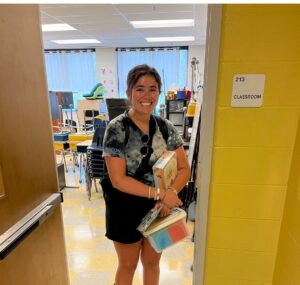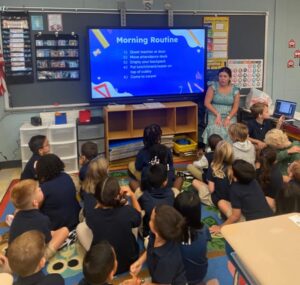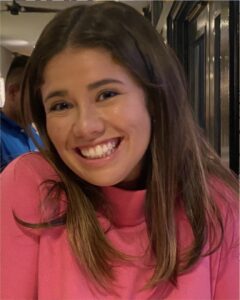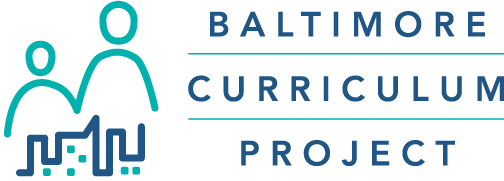We talked with first-year teacher, Emily Shapiro, as she completed year one as a 1st grade teacher at Hampstead Hill Academy, a Baltimore Curriculum Project (BCP) neighborhood conversion charter school. She reflected on her journey to the classroom, why she chose Hampstead Hill (HHA), and how BCP helps her embrace her calling in the classroom.
Q: Did you always want to be a teacher?
When I was younger, I told anyone I wanted to either be a Broadway star or a teacher. It became very apparent very early on I was not going to be a singer. As much as I loved attention, the voice wasn’t there. Then it was about who can I sit in front of all day, talk to and be on my stage? And it was being a teacher. My mom is a teacher, my dad’s now a teacher – he was a career changer – and both my aunts are teachers. I had the best examples, and it was just always something I wanted to do.
Q: Why the double major at Tulane in psychology and early education?
Tulane didn’t have a traditional education major, so I had to choose a coordinate major with psychology, which I ended up loving. I went to Israel for a year after college and taught there, and then I went to graduate school at the Teacher’s College at Columbia University. Graduate school was when I was really diving into more just traditional education, and with my psychology background, I understood the ‘why’ more. It gave me that edge when we studied different reinforcements and ways to connect with kids.
Q: Why early elementary? Why Hampstead Hill Academy?
 I always knew I wanted the younger end of elementary education. When selecting schools, I decided I would choose based on the school, not based on the grade. Hampstead Hill happened to have 1st grade available, but I would’ve done any grade. I really wanted to work here.
I always knew I wanted the younger end of elementary education. When selecting schools, I decided I would choose based on the school, not based on the grade. Hampstead Hill happened to have 1st grade available, but I would’ve done any grade. I really wanted to work here.
When I researched different schools in the Baltimore region, Hampstead Hill popped up in every article. What really sold me is they had been selected in 2022 as one of the Best Places to Work in Baltimore. I wanted to work somewhere where everyone is happy. After meeting with Matt Hornback, the Principal, I understood why HHA was voted the Best Place to Work because he is such a happy man. There’s such a trickle down. That’s ultimately what led me to BCP.
During my interviews, I really liked the coaching model that BCP has first-year teachers. It was really inviting to know that someone would be checking in on me once a week. I’m someone who’s very open to feedback. I wanted to be observed and have that constant feedback. During my interview, I met HHA’s coaches and loved them. What a great model and safety net. I don’t go more than a week without feedback, which has been really nice. Katie Johnson is my direct coach; I really value her feedback.
Q: How has the BCP coaching model helped you?
BCP schools teach students to read through the Direct Instruction (DI) method. I was trained over the summer on DI and was fairly confident going in. Regular coaching really set me up for success in my first-year teacher. I was having trouble structuring my math lessons, and Katie brainstormed with me on how to structure it and make it my own. She covered my class so I could observe the other two 1st grade teachers I work with, Megan Bierley and Jacqueline Clary Thomas. They’ve been such amazing colleagues.
Katie and I also would observe them together to brainstorm on what I could bring to my classroom. We workshopped a whole routine together, and then she helped me implement it. I can’t think of any other place than a BCP school where someone helps you like this. It’s just amazing.
Q: You grew up in Baltimore. Was returning always a goal?
No. I always knew I wanted to live in Israel. My two older cousins had done it, and I found this program for education that seemed right. I went from living in New Orleans to Israel. I love the warm weather. I would’ve stayed in Israel, but it did feel far for my family. I decided to come back to the States and always wanted to live in New York. I got into Columbia’s elementary inclusive program for special education and general education. I met my fiancé in New York, who is also from Baltimore, and he brought me back. I’m so happy to be back. It was the best decision.
Q: Has your first year gone like you thought it would?
Everyone has something different to say about their first year teaching, that it’s equally as crazy as it is fun. I would say my year has lived up to that. Every day’s a new adventure. Every day is a new obstacle or a new experience, but it’s been really fun.
Q: What did you not expect?
That’s a great question. I didn’t expect to be so integrated within the community so fast. With student teaching, you’re in and out in a few months, so I got used to being in a community and leaving. HHA puts a lot of emphasis on community. Mr. Hornbeck really cares about making sure you’re at community events and doing things outside the classroom and outside your grade level. And it works. You do feel really connected. I thought that I was going to have to wait a few years until my students aged up to really know the school, but students I’ve never met before will run by and say, ‘Hi, Ms. Shapiro.’ There really is such a pulse here, and the students are so happy to be here. Everyone feels included in their own way.
Q: How else have you been supported in your first year?
 Another huge BCP resource is my paraeducator, Irene Protopapas. She’s my lifeline. [Ms. Protopapas is full time in Ms. Shapiro’s classroom.] She’s been at HHA for 17 years and is a wealth of information on the school.
Another huge BCP resource is my paraeducator, Irene Protopapas. She’s my lifeline. [Ms. Protopapas is full time in Ms. Shapiro’s classroom.] She’s been at HHA for 17 years and is a wealth of information on the school.
There’s a new teacher mentor program for all the teachers who are new to HHA. We meet once a month with veteran teachers. Before our observations, they went over our lesson plans with us and then we debriefed. I also really try to be involved in HHA community events like setting up for Community Arts Nights and dinners. I’m hopeful within the next few years I’ll have my own club to advise.
I live on Eastern Avenue, the same street as the school. I love to walk to and from school and see my students on the walks. I live near B’More Licks ice cream shop, and there are always students outside with their families. It’s really fun to be part of the larger community.
Q: How was your first year with DI?
I drank the Kool-Aid! I really like it. I think it’s a great program. In elementary education, you don’t hear a lot about a whole class on grade level. Our classes are on grade level, and I attribute that fact to DI. It really works with the repetition and the sounds before letters. I really like teaching it.
Q: Has BCP’s use of Restorative Practices helped you?
When I was at Columbia, it was an inclusive education program. We spent a lot of time on Restorative Practices. My professors explained that, ultimately, it’s what is best for children and it makes your life so much easier. I remember bringing it up in my HHA interviews, and the coaches and Mr. Hornbeck explained that the school is very passionate about it.
It really does work. Recently, one of my students threw a pencil and was really upset. We went into the hallway and went through the Restorative Practices questions about what happened, why he did it, and who it affected. He was able to return to the classroom ten minutes later without needing the traditional punishments or detentions. He felt seen and heard. I felt seen and heard. Restorative Practices took a small situation that could have escalated to a really big one and put out the fire quickly.
It is so about being proactive. We try to do Circles [classroom gatherings to talk as a group about behavior and choices] two or three times a week. With 1st graders, we don’t really get into deep circles a lot, but just having a space where they can talk about who they are and what makes them them, helps instill identity at a young age.
Q: What are you looking forward to with your second year?
 This summer I’m getting married, so that’s very exciting. I am going to Oregon with my BCP colleagues for the NIFDI annual conference on DI. Everyone says once you do that training, everything really clicks. I am excited to unlock more about DI.
This summer I’m getting married, so that’s very exciting. I am going to Oregon with my BCP colleagues for the NIFDI annual conference on DI. Everyone says once you do that training, everything really clicks. I am excited to unlock more about DI.
I’m really excited just to keep putting roots down in Baltimore and at HHA. Everyone says once you get through your first year, then the second year is even better and a lot smoother because you know what to expect and you know what to do. I’m also excited to see my students mature into second grade.
Q: Was working at a community school that supports students and families beyond academics important to you?
Extremely. The other 1st grade teachers, Ms. Bierley and Ms. Clary Thomas, can tell you the names of their former students’ siblings and parents and what the parents do. It really shows how much they care. You’d be pressed to find a teacher or administrator at HHA who couldn’t do that. We see our students as kids and families before students.
My best friend, who was my roommate in Israel and in New York, teaches in a school in New York. On paper, our schools seem very similar. They each have three assistant principals. She is around the same class size of 30 students and has a para-educator in the classroom. But our levels of support are so different. I was telling her about the coaching system and having my Assistant Principal, Ms. Anderson, in my classroom to observe and build a relationship with me and my students. I haven’t met anyone who also has that outside of BCP schools.
Q: Do you have a favorite story from your first year as a BCP teacher?
I get so much support from the other 1st grade teachers, my coaches, and the administration. But the students also provide so much support. We got a new student midway through the year. I was nervous. This was my first time getting a new student. How do I teach them the routines this far into the year? Then a few of my students asked if it was okay if they showed her around and showed her where the bathroom, library, and cafeteria are. How mature that these 1st graders saw this other new student and thought to themselves, what would we need if today was our first day? I was so worried about her books and cubby and catching her up, but they said that she needs to know where the bathroom is. They were one-hundred percent correct. I credit their Kindergarten teachers and this community for instilling those things in them.
Congratulations on completing your first year in the classroom, Ms. Shapiro!
Interested in being part of the team at our BCP schools? Check out our open positions.
About Emily Shapiro
- Garrison Forest School, Preschool through 12th
- Tulane University, B.A. Psychology and Early Education
- Teachers College, Columbia University, M.A., Elementary Education and Teaching
- Teaching Fellow, Masa Israel Journey, Tel Aviv, Israel, 2021-2022
